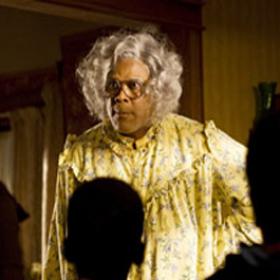Tyler Perry's I Can Do Bad All By Myself

3.5/5
With I Can Do Bad All By Myself Tyler Perry has opened yet another movie at number one at the box office, his second this year alone. As an African American who started off as a playwright this kind of success (to the tune of $400 million worldwide) is unheard of in Hollywood. The key to that success has always been Madea, a monstrosity of a woman (played by himself) who approaches life with a very old school sense of morality, and, occasionally, a shotgun. She shows up here, albeit in a small role, mostly for comedic and commercial reasons.
As the film opens, three rugrats are breaking into Madea’s house. She quickly apprehends them and returns them to their aunt April (Taraji P. Henson) since their grandmother, whom they live with, has been missing for a few days. To many the first thing they will notice about Henson is how…well…appealing she is. This is quite a departure from her downright scary role in Hustle and Flow. More important than her looks is the skill and delicacy she brings to this role. April is damaged goods and none to happy about it, and Henson manages to find and nail all of the nuances in this character.
April’s life is a mess and Perry, never one for subtlety, makes that abundantly clear. She drinks herself into a stupor on a nightly basis, smokes too much, and even sleeps with a married man. When the kids show up on her porch she treats them worse than the garbage she would find on her shoe. Not much time is spent on her two nephews but her niece Jennifer (Hope Olaide Wilson) is front and center. She is clearly an April in the making, filled with piss and vinegar and always spoiling for a fight. We are meant to believe that they are just two lost souls who are hurt and lonely and in need of a good man.
The film has lots of ups and downs that combine to create a very uneven viewing experience. Some scenes, such as Madea and Joe squabbling over the dinner table, are real gems. Others, such as Madea’s failed attempt to teach Jennifer about God, have no artistic value whatsoever. There are also five musical numbers to be found here, which is a new development for Perry but he handles it quite well. Mary J. Blige, playing April’s best friend, performs the Oscar worthy title song in what is probably the best thing about this film. But then, later on, there are a few musical numbers performed in church that go on for all eternity and suck the life right out of the theatre.
Also in the mix here is Sandino (Adam Rodriguez), a man who is renting a room from April and providing a stark contrast to her reptilian boyfriend Randy (Brian J. White). Perry tries way too hard to draw parallels between him and Jesus. He’s poor, he’s selfless, he builds stuff with his hands, he has a compulsion to save everybody…we get it! Of course he would be better for April than Randy, but his character would have been infinitely more interesting had he had at least one flaw.
Your ability to stomach this film will be directly correlated to your tolerance for having religion and family values stuffed down your throat. Perry is speaking to a niche market that has been very good to him but perhaps in the future his characters will be able to find other solutions to their problems than going to church and loving their family. That said, domestic violence and child abuse remain somewhat OK in his book, probably because they are just so darn funny. There is a lot to like here and Perry is growing as a writer and a director but there is no reason that this film can’t wait until it comes out on Netflix.
Starring: Taraji P. Henson, Tyler Perry, Hope Olaide Wilson, Brain J. White
Director: Tyler Perry
Runtime: 113 minutes
Distributor: Lionsgate
Rating: PG-13
RELATED ARTICLES
Get the most-revealing celebrity conversations with the uInterview podcast!





Leave a comment